The Billions of dollars spent on advertising could be used for scholarships and other youth programs....
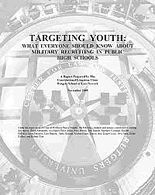 Under the supervision of Clinical Professor Penny Venetis, the following students and interns contributed to writing this report: Heidi Alexander, Avi Appel, Erica Askin, Amy Brown, Eric Bueide, Matthew Coleman, Randle DeFalco, Jason Fertakos, Lisa Hansen, Safia Hussain, Michael Isaac, Syrion Jack, Daniel Louis, Devi Shah, Nadia Rollins, and Robert Ulon.
Under the supervision of Clinical Professor Penny Venetis, the following students and interns contributed to writing this report: Heidi Alexander, Avi Appel, Erica Askin, Amy Brown, Eric Bueide, Matthew Coleman, Randle DeFalco, Jason Fertakos, Lisa Hansen, Safia Hussain, Michael Isaac, Syrion Jack, Daniel Louis, Devi Shah, Nadia Rollins, and Robert Ulon.
Indeed, under 10 U.S.C.A. § 503, the “Secretary of Defense is required by law to enhance the effectiveness of DOD’s recruitment programs through an aggressive program of advertising and market research targeted at prospective recruits and those who may influence them.”...
The military has conducted extensive research into the psychological and behavioral factors that influence teenagers to enlist in the military....The Defense Manpower Data Center (DMDC) administers the YATS to students annually so that changes in youth “demographic trends, cultural characteristics, attitudes, and educational attainments” can be tracked by the DOD to formulate recruiting strategies....
The military’s marketing campaigns emphasize patriotic themes and tales of adventure that appeal to teenage sensitivities, while downplaying the actual risks of war....
[I]n teens, the judgment, insight and reasoning power of the frontal cortex is not being brought to bear on the task as it is in adults.
The United States Supreme Court has also recognized the psychological vulnerability of children and teenagers in several landmark decisions. In 2005, in discussing why the execution of juveniles is unconstitutional, the Supreme Court cited “[s]cientific and sociological studies documenting the tendency of adolescents to make “impetuous and ill-considered decisions”; their susceptibility to “negative influences and outside pressures": and the "transitory" nature of their character traits....
Recognizing the psychological vulnerability of children, Congress passed laws prohibiting slick marketing campaigns that glamorize risky behaviors such as smoking and drinking. For similar reasons, as the obesity rate among young people has soared, school officials and legislators have targeted the sale of unhealthy foods on school campuses....
While a broad consensus exists that teenagers lack the decision-making capacity of adults, the military deliberately exploits this immaturity by equating the military with video games and other entertainment....
Often the military prominently displays its promotional materials inside or nearby the school cafeteria, where the entire student population can be exposed to the recruiters’ messages....
The Army also plans to use cell phone text messages, helicopter simulators in the back of eighteen wheelers, and visits to NASCAR and rodeo races. “[R]ecruiters will visit schools and malls a few days before an event, offering free tickets and the chance to meet famous drivers or bull riders.”
Military recruiters create a customized “pitch” for each individual student based in part on personal information gathered from the Armed Services Vocational Aptitude Battery test (ASVAB)....
Military recruiters are instructed to “read yearbooks to ‘mysteriously’ know something about a prospect to spark the student’s curiosity.”...
"[C]hallenge his ego by suggesting that basic training may be too difficult for him and he might not be able to pass it."...
Recruiters view each teenager as a potential sale, rather than an individual who is trying to navigate the difficult years of adolescence. Indeed, the Secretary of Defense’s Director of Recruiting Policy stated that the military concentrates on schools most likely to “maximize returns on the recruiting dollar [because] the advertising and marketing research people tell us to go where the low-hanging fruit is. In other words, we fish where the fish are.”...
[T]he military’s School Recruitment Program Handbook (“SRP Handbook”), instructs them to “penetrate the school market” and achieve “school ownership.”... High schools are referred to as “markets” where recruiters make “sales presentations” to students....
[R]ecruiters are becoming fixtures in the public school system....
Recruiters are told to give out free mugs, calendars and office supplies with the Army logo on them to school employees...
The SRP Handbook refers to educators as “tools” to further implement the military’s goals....
To facilitate this “ownership,” recruiters are instructed to approach youths as early and as often as possible and to seek help from school administrators and popular students, or “centers of influence,” (“COIs”) in the recruiting process....
"If you wait until they’re seniors, it’s probably too late." ...
[T]he SRP Handbook encourages military recruiters to “[g]et involved with local Boy Scout troops,” because “ scoutmasters are typically happy to get any assistance you can offer.” ... the actual age range for the Boy Scouts is ten to eighteen years old. This means that military recruiters not only target younger high school students, but have access to boys as young as ten years of age, without any parental knowledge or permission....
"Some influential students such as the student president or the captain of the football team may not enlist; however, they can and will provide you with referrals who will enlist."...
"Know [their] student influencers. Students such as class officers, newspaper and yearbook editors, and athletes can help build interest in the Army among the student body. Keep them informed."...
"Be indispensable to school administrators, counselors, faculty, and students. Be so helpful and so much a part of the school scene that you are in constant demand ... Cultivate coaches, librarians, administrative staff, and teachers"...
Military recruiters are instructed to “eat lunch in the school cafeteria" ... The Army’s “Calendar of School Activities” urges military recruiters to "wear [their] dress blues" to school events commemorating Martin Luther King, Jr.'s birthday and to participate in activities during Black History Month and Hispanic Heritage Month. There is no mention, however, of similar events such as Columbus Day and Saint Patrick’s Day, which are days of ethnic pride for Irish and Italian-Americans....
[T]he Navy created a Web site, called El Navy, which is designed to better communicate with the Hispanic market,” and “the Army has specifically tailored radio advertisements to reach the African-American market.”...
"Obtain a copy of the HS fall sports and activity calendars [and] arrange to have the schedules copied with the RS [Recruiting Station] address prominently displayed. Post them throughout the RS area, including restaurants, arcades, and anywhere else students congregate"...
"Contact the school’s student government ... to discuss what the Army and you can do to assist them in the upcoming SY ... The football team usually starts practicing in August. Contact the coach and volunteer to assist in leading calisthenics or calling cadence during team runs"...
"Attend athletic events at the HS ... Get involved with the parent-teacher association ... Obtain a tactical vehicle from a local USAR [“US Army Recruiting”] troop program unit and drive it in the parade with your future Soldiers riding along.... Deliver donuts and coffee for the faculty once a month.... Hispanic Heritage Month. Participate in events as available"...
"Offer to be a chaperone or escort for homecoming activities and coronations."...
"Assemble and offer a color guard for the opening home game... Prior to Thanksgiving, many student organizations gather food baskets for needy citizens. Offer your assistance and get involved."...
"Contact college students who are home during the holidays." ...
"Turn up the tempo on contacting your juniors." ...
"[A]rrange for an exhibition basketball game between the faculty and Army recruiters." ...
"Prepare certificates for those faculty and staff members who have aided you in your HS recruiting efforts.... present these certificates at a COI [Center of Influence] event.... Continue to advertise in school newspapers and conduct class presentations."...
"Basketball season starts. Offer assistance to the coach." ...
"[S]end thank you notes to those staff and faculty members who have been helpful ... Secure and present USAR Scholar/Athlete Awards at HS graduation or award ceremonies ... Assist in arranging a color guard for the graduation ceremony ... Coordinate with school officials to determine if they can use your assistance during summer school.” ...
All four branches of the armed forces host all-expense paid workshops for educators....
Allen Kanner, a clinical psychologist and researcher on military recruiting, calls the use of teachers “a very clever marketing technique,” and explains: “Teachers are role models, and if they approve of something, then the students believe the whole school system approves of it.” ...
In 2008, to increase enlistment, the military increased its bonus allowance from $1,000.91 to $2,000.92 to members of the Army, National Guard, Army Reserve, retired service-members, and civilian Army employees who refer potential enlistees to recruiters. Authorized by the National Defense Authorization Act for Fiscal Year 2008, active service members or veterans who convince someone to enlist receives $1,000 when the referred enlistee commences basic training, and another $2,000 when the referred enlistee completes basic training and individual advanced training. Under this program, essentially every service-member acts as a recruiter. The program encourages deceptive recruiting practices. Service members have a financial incentive to glorify the war and to minimize negative experiences.
***
Students who object to military presence in their high schools can be ostracized. For example, at one high school in Southern New Jersey, a student was reprimanded and ostracized for refusing to participate in a recruiter-led gym class that simulated military training. During the gym class, students were told to respond “yes sergeant” to the recruiter’s orders. The penalty for failing to respond was 20 push-ups. One student who refused to participate was removed from gym class for the day and initially given a “0” grade.
The student was later harassed by students and members of the school’s staff. Students called him “un-American” and a “Communist.” One student openly confronted him about the incident, sparking a public argument. A teacher chastised the student for refusing to participate in the military exercise. While doing so, the teacher referenced his grandparents who were holocaust survivors.
***
The irony is that DHS students and real Marines actually do share much in common. Both groups are largely poor. Enlisting in the Marines would not provide the average DHS student a way to escape their unpromising life. It will only change the scenery from Southern Texas to Iraq or Afghanistan, and add the risks of snipers, roadside bombs and firefights.
***
[A] Department of Defense policy change highlights that rape is pervasive.
***
Advantages to Enlisting During College: (1) Higher Sign-On Bonuses, (2) Those with Associates Degrees and college credits also qualify for higher sign-on bonuses, (3) Better Pay, (4) Those with Associates Degrees and college credits qualify for higher pay than enlistees who are only high school graduates, (5) More Elite Jobs....
In addition to receiving the benefits listed directly above, college graduates who enlist may reap additional benefits. The military has student loan repayment programs which can help enlistees repay existing student loans. Additionally, college graduates may be eligible to enlist directly into the officer candidate schools of the various military branches. This puts them on a fast-track to interesting careers with better pay and benefits.
***
E/COI tours are designed to be professionally enriching experiences for key influencers. They are not junkets or rewards for cooperation with recruiters. Tours are resources that must focus on those areas (access, ASVAB testing, and release of directory information) that need special attention. Tours provide E/COIs the opportunity to view Soldiers in a training environment. Many participants become informed supporters who publicize and promote Army opportunities with students, graduates, and other key influencers.
-- Targeting Youth: What Everyone Should Know About Military Recruiting in Public High Schools
Source: http://www.american-buddha.com/rep.targetingyouthrutgers.htm
###

 As a counterpoint to the current hand-wringing over public education in the U.S., it may be helpful to remember that we will spend a comparatively small amount of time during our lives as students in the classroom. That the focus thus far has been on teachers and tests should not surprise us, however. These are tangible, and measurable, aspects of education. It happens to be much harder to reform – or even to keep track of – the educational force of culture. What does that force look like? As C. Wright Mills put it in his famous BBC address, “The Cultural Apparatus,” we base our understanding of the world around us not only on schools but also on “the observation posts, the interpretation centers” and “presentation depots” of the mass media and entertainment industry (Mills 406). “Taken as a whole,” Mills continued, “the cultural apparatus is the lens of mankind through which men see; the medium by which they interpret and report what they see” (Mills 406). The media’s overpowering influence in our lives and the fact that we never actually confront pristine reality (only a mediated version thereof), raises the question: Could the cultural apparatus be the most influential teacher we ever have?
As a counterpoint to the current hand-wringing over public education in the U.S., it may be helpful to remember that we will spend a comparatively small amount of time during our lives as students in the classroom. That the focus thus far has been on teachers and tests should not surprise us, however. These are tangible, and measurable, aspects of education. It happens to be much harder to reform – or even to keep track of – the educational force of culture. What does that force look like? As C. Wright Mills put it in his famous BBC address, “The Cultural Apparatus,” we base our understanding of the world around us not only on schools but also on “the observation posts, the interpretation centers” and “presentation depots” of the mass media and entertainment industry (Mills 406). “Taken as a whole,” Mills continued, “the cultural apparatus is the lens of mankind through which men see; the medium by which they interpret and report what they see” (Mills 406). The media’s overpowering influence in our lives and the fact that we never actually confront pristine reality (only a mediated version thereof), raises the question: Could the cultural apparatus be the most influential teacher we ever have?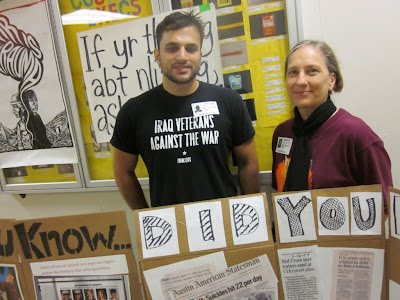 Last week, we made our first SOY visit of the new school year to Austin High School. Tami and I were pleased to be joined by Ben, a Marine Corps veteran and member of Iraq Veterans Against the War who recently moved to Austin. While Ben was a student at the University of North Texas, he did organizing with Rising Tide North America, an environmental group addressing fracking and the tar sands pipeline. It was great to have Ben with us and to be able to stretch out our table of materials so that 3 of us could interact with students. Photos at
Last week, we made our first SOY visit of the new school year to Austin High School. Tami and I were pleased to be joined by Ben, a Marine Corps veteran and member of Iraq Veterans Against the War who recently moved to Austin. While Ben was a student at the University of North Texas, he did organizing with Rising Tide North America, an environmental group addressing fracking and the tar sands pipeline. It was great to have Ben with us and to be able to stretch out our table of materials so that 3 of us could interact with students. Photos at  I started receiving recruitment emails from a Marine captain with the clockwork regularity characteristic of the military in the beginning of my first semester at Fordham. The Marine captain was vague on most details, but he explicitly listed the benefits of enlisting in colloquial English: “There is no obligation on behalf of the student. You attend during the summer, you get paid. You’ll return to school knowing you have a job opportunity waiting at graduation (15?, 16?) if you wish to accept your commission.” I could easily picture myself without a summer job, and therefore deciding to spend a few weeks in Officer Candidates School in Quantico, Virginia seemed appealing. I did not intend to enlist in the Marines, but if they were willing to pay me to go to this training school, the idea of attending did not seem ridiculous. I never considered unsubscribing from the emails, let alone doing anything about the military’s privileged access to students.
I started receiving recruitment emails from a Marine captain with the clockwork regularity characteristic of the military in the beginning of my first semester at Fordham. The Marine captain was vague on most details, but he explicitly listed the benefits of enlisting in colloquial English: “There is no obligation on behalf of the student. You attend during the summer, you get paid. You’ll return to school knowing you have a job opportunity waiting at graduation (15?, 16?) if you wish to accept your commission.” I could easily picture myself without a summer job, and therefore deciding to spend a few weeks in Officer Candidates School in Quantico, Virginia seemed appealing. I did not intend to enlist in the Marines, but if they were willing to pay me to go to this training school, the idea of attending did not seem ridiculous. I never considered unsubscribing from the emails, let alone doing anything about the military’s privileged access to students.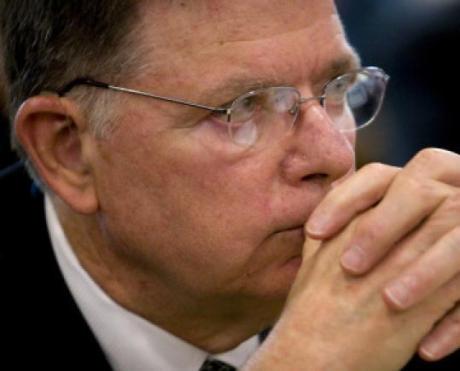





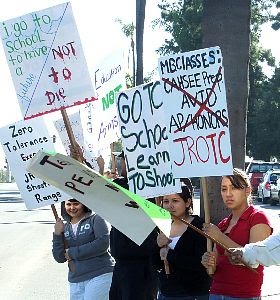

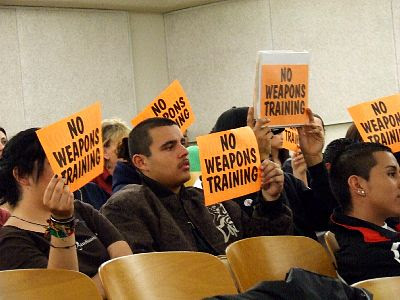
 In different countries, war and militarisation take on very different meanings and have different effects, depending not only on the presence or absence of direct acts of war but also on country's political, economic, and social circumstances, and its history and traditions. As these factors define not only to the types, levels, and effects of militarisation but also the ways in which it can be effectively resisted, the scope of this article is inevitably limited; it can only provide a Western, European, largely German perspective on the use of direct action to oppose the militarisation of youth, although it explores possibilities in other countries nonetheless.
In different countries, war and militarisation take on very different meanings and have different effects, depending not only on the presence or absence of direct acts of war but also on country's political, economic, and social circumstances, and its history and traditions. As these factors define not only to the types, levels, and effects of militarisation but also the ways in which it can be effectively resisted, the scope of this article is inevitably limited; it can only provide a Western, European, largely German perspective on the use of direct action to oppose the militarisation of youth, although it explores possibilities in other countries nonetheless.